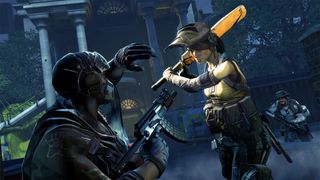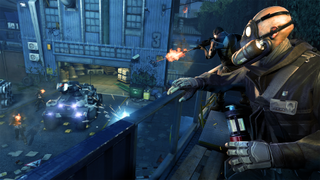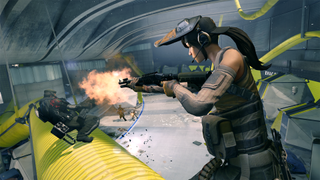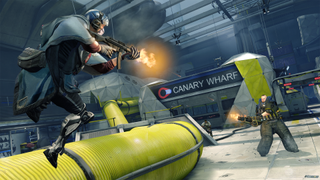Tactical fast-paced teamwork in Dirty Bomb

Fresher developers like Vlambeer or Supergiant may feel obliged to do something different every time, but Splash Damage's veterans know the value of specialisation. Their two critically-acclaimed Enemy Territory titles made them the multiplayer shooter specialists du jour, up there with Turtle Rock and Valve themselves, so they're well aware that they've found their niche. As the game's writer Ed Stern told me, "dynamic objective teamplay is sort of our special sauce." And that's Dirty Bomb all over.
You may know Dirty Bomb by another name. It was temporarily redubbed 'Extraction' until Splash Damage were presumably sued by a coalition of dentists and/or miners and changed it back. It's a free-to-play multiplayer-only team shooter set in an abandoned near-future London.
Splash Damage say that this is the game that they always wanted to make
In this near future, London has been devastated by the dirty bomb of the title, a mucky radioactive explosive that's left the city centre as uninhabitable as Blackpool in the off-season. You play as mercenaries from Private Military Corporations dropped into the city to loot it as quickly as possible—and stop others from doing the same.
Splash Damage say that this is the game that they always wanted to make, which is a fair claim. And the entire team admit that Dirty Bomb is definitely revisiting Enemy Territory's, uh, territory. It certainly is more like Enemy Territory than most of their previous games. It's got Splash Damage's mapmaking knowhow, ET's teamplay focus, and all the flash of the Arkham Origins multiplayer. I can only hope it hasn't inherited any of Brink's flat combat and launch problems.

I went to Splash Damage's London office to get hands-on with the code. Like any press event, this was a controlled exposure; I got to play a stable early beta slice of the game, in teams, assisted by developers from Splash Damage. The XP rate was artificially accelerated, so equipment and characters unlocked faster than they would. And of course, I was playing on their computers, on their local network.
At the event, they showed off two of the five areas, both modelled after areas of the team's home city of London (though Splash Damage is actually based in the geriatric suburbs of Bromley). Chapel is based on Whitechapel and Underground is based on Canary Wharf. Both are long, thin maps using the Stopwatch game mode, where the attacking team needs to complete multiple objectives in order to achieve their nefarious aim. In Chapel, you need to escort an armoured vehicle to a docking station, then hand-deliver some EMP charges to take down a building. In Underground, you must capture some extractor fan controls, then destroy the pump controls to flood the station.
Diving in, you pick three characters, who you can swap between in-match. Each of the 15 characters has unique weapons and abilities, much like Evolve. So being a medic means that they'll bring some healing ability to the table, but it can vary enormously, from Aura's mobile healing turrets to Sawbonez's dropped med packs to Phoenix, who can rez himself if he's downed. Then you can choose a loadout—a further customisation that heavily alters the character's cooldowns and abilities, shifting his capabilities without changing his role.
The biggest gaming news, reviews and hardware deals
Keep up to date with the most important stories and the best deals, as picked by the PC Gamer team.

There's a nice mob of characters to choose from. All players start with the same line-up, and more advanced characters are unlocked through play. Nader, for example, spams grenades, including a hugely irritating suicide-bomb special ability when she's killed. Splash Damage is taking great care to balance them all, in every corner of every objective of every map. "I totally understand why more developers don't use this approach," says Stern "Yeah, it's hard, and it's one of the reasons we've been taking so damn long about it."
In the game itself, combat had the variety and resilience of Team Fortress 2. The actual moment-to-moment Dirty Bomb is achingly familiar, but still compelling to play. Like Team Fortress 2 and CoD, it has many of those moments where you're completely in the zone, drooling and shooting on reflex—though, at this stage, it lacks the almost off-putting comical complexity that's been thrown up by TF2's multiple mutators, modes and endless equipment. Notably, it also has resurrected Unreal Tournament 2003's much-missed wall-jumping.
Dirty Bomb is achingly familiar, but still compelling to play.
Distinct from that, though, communication was key to victory—every time my team was silent we lost, but when we relayed information clearly and fast, we won, both on defence and offence. Much of the strategy comes from choosing when to swap characters, when to drop ammo packs and medikits, when to finish off a downed enemy and timing your deaths to hit the latest respawn wave.
Post-match, a progression stream like that of Payday unlocks new characters, maps and modes. "We'll certainly be scattering XP about like rose petals for the more team-minded players," says Stern. However, players can also acquire pay-to-unlock chests which at the moment only contain new loadouts, but will almost certainly contain hats, otherwise Ed wouldn't have called it "the milinery-industrial complex."

There's a little way to go in balance yet; it took me two matches playing mainly as the medic Aura to realise that my primary weapon was a shotgun and not a mid-range carbine. Despite that, I still managed to get an equal K/D ratio. That that shows that either (a) I'm an idiot (likely) and/or( b) that in terms of audio-visual feedback and weapon balance, there's some work to be done.
Dirty Bomb has been a long time coming. The single mode I played was thrilling and familiar in equal measures, the array of characters meshed nicely together, and the tried-and-tested team mechanics had received a knowingly-modern refresh. Dirty Bomb may set the world alight - or it could be a damp squib.
Most Popular

